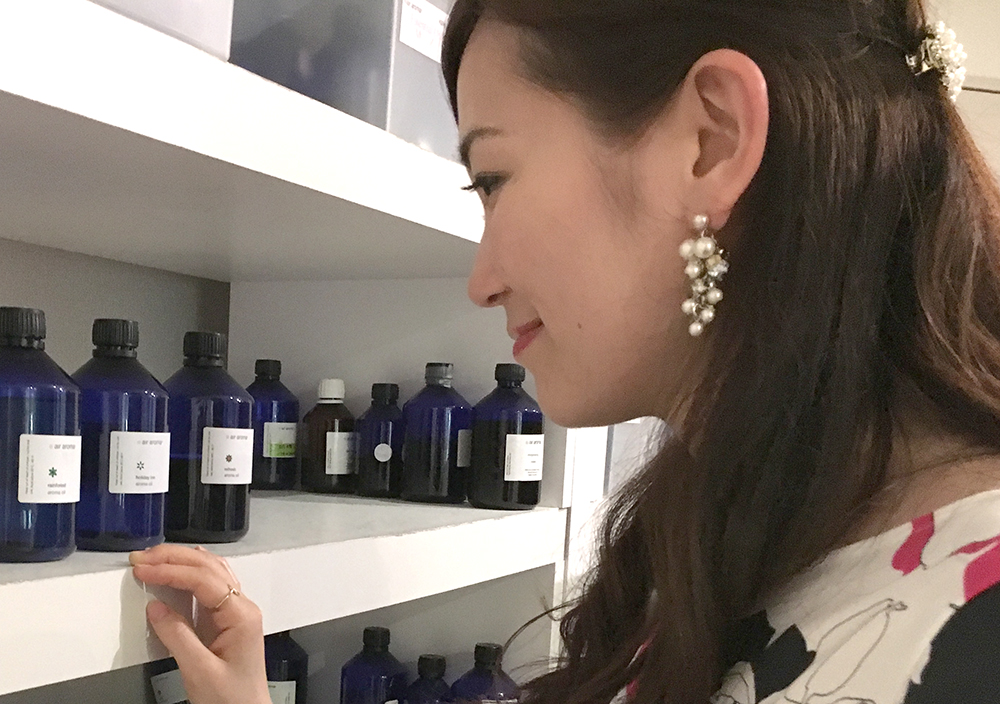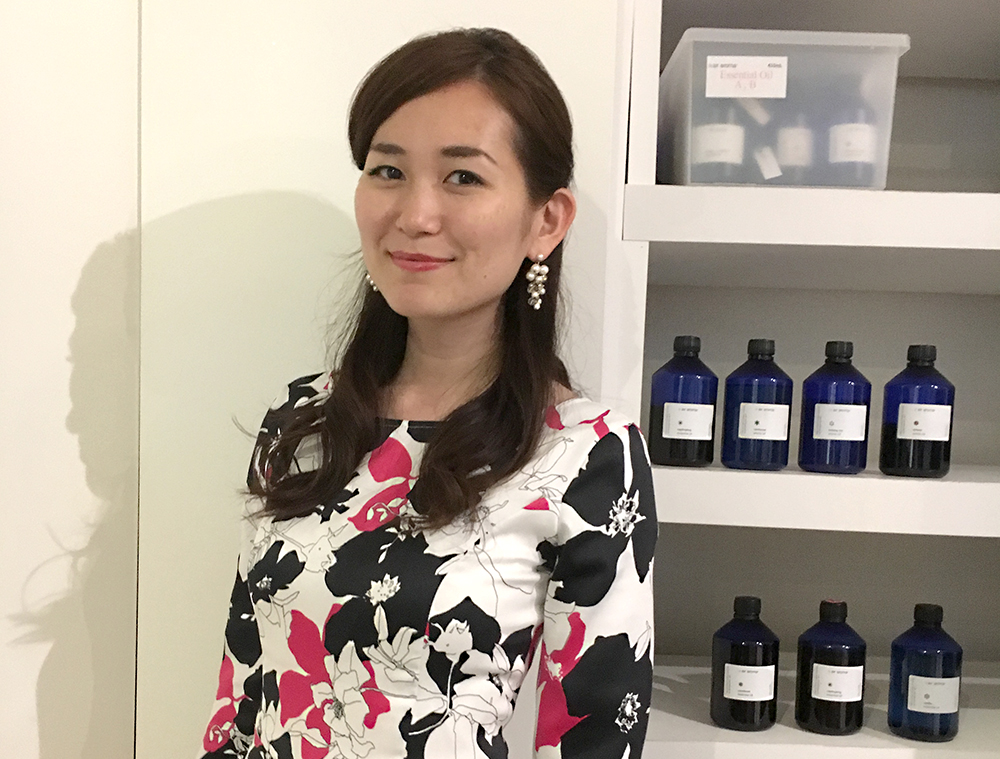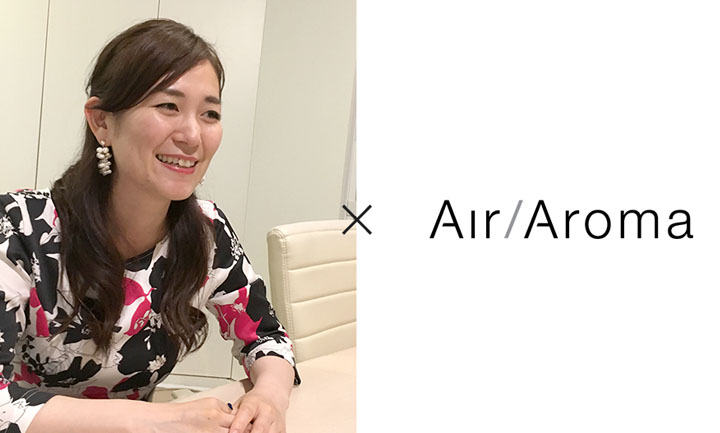デビュー曲「あんた」で「第54回 輝く!日本レコード大賞」新人賞を受賞、「あんた」の他にも「あかん」「しもた」といった関西弁のラブソングで知られるティーナ・カリーナさん。シンガーソングライターとして活躍する一方、長く歌い継がれている昭和歌謡のカバーコンサートも定期的に開催しています。
今年春から、エアアロマの香り「teena(ティーナ)」でコンサート会場を演出する取り組みをスタートしました。
歌手としてのティーナ・カリーナさんが感じる香りの効果、実際にコンサート会場を香りで演出した時に感じた変化について、また、東日本大震災直後に仙台に移住し東北の人々と接する中で変わっていったご自身の価値観についてなど、対談形式でお話しを伺いました。
<ティーナ・カリーナさんプロフィール>
1986年1月16日生まれ 大阪府池田市出身。元阪急百貨店サービス優秀販売員(金バッジ受賞)という異色の経歴を持つシンガーソングライター。デビュー曲「あんた」で「第54回輝く!日本レコード大賞」新人賞受賞。
震災後まもない仙台という地に、彼女のデモテープが送られてきた。くしくも阪神大震災を経験していた彼女の歌声が、復旧作業で慌ただしい日々を送っていたプロデューサーの心に響いた。目頭が熱くなる程情熱的でまっすぐな歌声、強い思いの込められた力強いメッセージ。彼女の魅力を知るには音源だけで十分たるものだった。1,000キロ以上も離れた大阪と仙台が奇跡的につながった瞬間だった。こうして彼女は25年間住み慣れた大阪から、仙台という新しい地へ居を移し、音楽業界初となる「大阪出身・仙台発信アーティスト」、ティーナ・カリーナが誕生した。
香りが相乗効果を起こしてくれている気がします。
歌と香りって相性がいいのかも。
県民会館がより特別な場所になった気分でした。
— Air Aroma(以下、A)
今回、ティーナさんと同じ名前の香り「Teena(ティーナ)」で、コンサート会場を演出したわけですが、実際に会場に香りが入ってどうでしたか?
— ティーナ・カリーナ(以下、T)
すごくいい香りですよね。あったかくて、なんかホッとする感じ。
ライブが始まる前も終わってからも楽屋が良い香りなので、緊張せずリラックス出来ました。普段一つの香りを嗅ぎ続けるってないんですけど、最近この香りをずっと嗅いでいるんです。
なんか落ち着くので(笑)
— A
「Teena(ティーナ)」の香りって白のイメージなんですが、それは東北の雪のイメージでもあるんです。白のイメージで香りを調香すると、エレガントだけど薄くなってしまうんです。そして雪の白だけのイメージだとすごく冷たくなる。でも「Teena(ティーナ)」の香りは白だけど、東北の人たちの温かみが香りにある。そしてティーナさんのフレッシュ感が感じられる香りなんです。

— T
今回のコンサートは準備の関係でお客様の場内への入場をお待たせしてしまったのですが、ほとんどの方がクレームもなく、香りが漂うロビーで整然とお待ち頂けたことに正直驚きました。
— A
香りって人と人との距離を縮めてくれるんですよね。香りあると、その空間をより身近に感じることができる、そして、人を丸くするようなところがあるんです。
例えばホテルとかだと、働いている従業員もお客さまも丸くなってサービスが良くなるんです。
でも、臭いから香りを入れたいというお客様がたまにいるんですけど、その場合、臭いよりもサービスが悪かったりすることがあるんです。それじゃいくら香りを入れても何のプラスにもならない、空間と香りがうまくマッチしてこそいい体験を持って帰ってもらえるんです。
実は、会場で配ったアロマチップを万歩計に両面テープで貼り付けて持ち歩いてる、とわざわざ連絡をくれた方もいたんですよ。買えないですかって。
— T
本当ですか?嬉しいですね。
なんか香りが会場の邪魔をしないっていうか、相乗効果を起こしてくれている気がします。歌と香りって相性がいいのかも。
香りによって県民会館が、より特別な場所になった気分でした。
結果的に、家に帰っても香りを嗅いでコンサートのことを思い出してもらえるってことは、空間と香りがうまくマッチしたんですね。
------------
音楽って最終的には人と人との間にあるもので、
同じ空間で同じ時間を過ごすっていうことがすごく大事。
香りと似ているかもしれないですね、形がないものじゃないですか。
— A
ティーナさんにとって、歌手としてのティーナ・カリーナのイメージはありますか?
— T
私、歌っている人の人生とか人間性ありきで曲を聴くんですよ。
どんな人生を歩んで、どんな性格なのかとか。歌う人がいい人やと、歌も好きになる。人柄がすごい重要やと思ってて。
イメージというか、自分がちゃんとした人生を送るのが目標なんです。もっと大きくて、人間味のある人になれば歌ももっと深みが出るんじゃないかなぁと。
— A
「Teena(ティーナ)」の香りと自分のイメージのリンクには違和感はなかったですか?
— T
逆にこういうイメージなんだって嬉しかったです。
私っていうか、その場のみんなで作るティーナ・カリーナの世界観。
一人じゃなんだっていう幸せな感じがします。
— A
香りって人と人を繋いでくれる、嗅覚のコミュニケーションなんですよ。
— T
嗅覚のコミュニケーション!まさに、私も音楽って人とのコミュニケーションやと思ってて。やっぱり、音楽って最終的には人と人との間にあるもので、同じ空間で同じ時間を過ごすっていうことがすごく貴重なことやし、大事なことやと思います。
歌ってなんですか?って聞かれたら、人と出会うためのものって答えます。
歌を聴くと思い出がよみがえったり、香りと似てるかもしれないですね、形がないものじゃないですか。

------------
おばあちゃん今度コンサート行かへん?って、
普段あんまり出掛けないおばあちゃんと一緒に行けたり、
そんな風になれば理想。
— A
今は歌手としてだけでなく、バラエティでも活躍されてますけど、テレビで仙台から気仙沼まで約130kmを1年かけて歩いたんですよね?
— T
そうなんです!
ミヤギテレビ開局45周年の企画で、去年の4月から一年かけて国道45号を宮城と岩手の県境を目指して、歩いて旅をしました。
旅の途中で会った人の話や、綺麗な景色、その土地土地で感じたこと、そして私自身、小学4年生で阪神大震災を経験しているので、自分の思いを込めた曲を作詞作曲しながら歩きました。
— A
実は、ティーナさんがテレビでも訪れていた、気仙沼の「唐桑御殿つなかん」がエアアロマの初の社員研修場所だったんです。
エアアロマの設立は東日本大震災直後で、オフィスの資材も届かないし、電気も通らないし、大変な状態で会社を運営できる状況じゃなかったんです。でも、社員みんなを結束させないとならない。そこで、代表の柳川が故郷下関のふぐ汁を炊き出しに行ったりしていて交流のあった、つなかんさんにお願いして研修場所にさせてもらったんです。
何度行っても思いますが、気仙沼の人たちはみんなエネルギッシュですよね。
— T
気仙沼は若い子がいっぱいいるんですよ。ボランティアで来て、気に入って奈良から引っ越してきた子とか、神戸の市役所に勤めてたっていう子とか。
土地の魅力なんでしょうね。
— A
そうなんですよね。研修の後も気仙沼で地震があったりすると、みんなで気仙沼のみんな大丈夫かなって話したり、1回しか会ってないけどそういうあたたかい気持ちになる、東北ってそういう場所なんだなって思います。
いつも元気で笑顔の気仙沼の人たちですけど、夜に飲みながら話すとやっぱり目の前で自分の家が流されちゃった人とかいて。そういう話を聞いて、私たちはちょっとのことで文句を言ったらいけない、というようにエアアロマのスタッフの感覚も変わって行きました。
— T
遠いからそんなに頻繁に行けないんですが、次来る時は連絡くれれば駅まで迎えに行きますよとか言ってくれたり、みんな最後のゴール地点で待っててくれたり、あったかいですよね。
— A
実際に仙台に住んで、気仙沼まで歩いて、東北の見方は変わりました?
— T
変わりました。
去年は初めて夏の時期に被災地に行ったんです。
津波のあった沿岸部には冬の時期に訪れる事が多かったんですが、夏は冬と違った緑の景色があって、テレビで放送されないからみんな知らないだけで、みんな1年1年、1日1日を生きている。
おばあちゃんが、海から離れた仮設住宅に住んでいて海を見るのは怖いけどやっぱり恋しいっていうのを聞いて、何でなんかな?と思ってたんですよ。でも歩きながら穏やかな海を見ていると、朝起きる時も夜寝る時も波の音を聞きながら生活していた人にとって、その一緒に生活していたものが無くなるっていうのは、何か生活の一部が欠けた感じに近いんやろうなって思いました。
過去にも地震とか津波は何回もあったので、その時の石碑とかけっこうあるんですよ。津波で今回すごい被害はあったけど、海辺の人にとったらそれも含めて、故郷なのかなと思いました。
— A
ティーナさんは昭和の歌を歌う「昭和歌謡祭」を定期的に開催してますけど、おじいちゃんおばあちゃん、家族で来ている人も多いですよね。
目には見えないけど、やっぱり歌を聴いて安心したり懐かしがったり、故郷を想う人も多いんじゃないですか?
— T
そうですね。音楽って歌ってた人が亡くなっても、誰かが歌っていれば生き続けるものだし、コンサートが終わったあとに「お母さんが若い頃は〜」みたいな話を家族とできるっていうのは、なんかいい時間やなぁって思います。
いつも離れてるけど、おばあちゃん今度コンサート行かへん?って、普段あんまり出掛けないおばあちゃんと一緒に行けたり、そんな風になれば理想で、そういう風になってきてるから嬉しいですね。

— A
最後に、今後について聞かせてください。
— T
昭和歌謡祭も、少しずつ宮城県以外でも開催できるようになってきたので、もっともっと色んな所でやりたいなと思っています。もちろん、関東や関西でも。
2016年 秋の特別公演情報
【ティーナ・カリーナ「ひとり昭和歌謡祭」秋の特別公演】
■日時:2016年9月18日(日)
■会場:東京エレクトロンホール宮城 (宮城県民会館)
▼ 詳細はこちら
http://www.hitorishowa.com/top/page-112/
----
Talk between Tiina Kariina × Air Aroma
Winner of the New Artist Award in the 54th Japan Record Awards with her song Anta (You), singer Tiina Kariina’s love songs also include Akan (Hopeless) and Shimota (Damn!), both sung in the Kansai dialect. She is a singer-songwriter who also covers tunes from the “good old days” of the Showa era in her regular concerts.
Starting this past spring, Air Aroma has begun scenting Tiina’s concert venues with a scent called “Teena”.
We spoke with the artist about her thoughts on “scenting” concerts, the changes she has noticed since incorporating scents, and about her decision to move to Sendai shortly after the 2011 Tohoku Earthquake, her connection with the people of the region, and how her outlook on life has changed in recent years.
Tiina Kariina Bio
Born January 16, 1986 in Ikeda, Osaka. Singer-songwriter with an accomplished past as winner of the “Gold Badge Award” as salesperson for the Hankyu Department Store. Won the New Artist Award in the 54th Japan Record Awards with her debut single Anta.
Shortly following the Tohoku Earthquake, a producer in Sendai received a demo tape. It was from a singer who had experienced the Great Hanshin Earthquake herself years earlier, and her voice struck a chord with the producer amid earthquake relief efforts. Her voice was powerful and passionate, her songs brimming with message. The demo tape was enough evidence of her talent. The miraculous connection led to the artist moving 1,000 kilometers from her home in Osaka to Sendai and beginning her career as Tiina Kariina, an Osaka-born, Sendai-based artist.
I feel that scents create a synergy.
I think music and scents go well together.
With the scent, I feel the concert venue becoming an even more meaningful place.
- Air Aroma (A)
We incorporated a scent called “Teena” into your concert venue. How was the experience for you?
- Tiina Kariina (T)
The scent is lovely. It’s warm and comforting to me. My dressing room smelled so nice, I felt relaxed both before and after the show. It’s rare for me to count on just “one scent” but recently, this is the only scent I’ve kept with me. It relaxes me. (laughs)
- A
If we were to assign a color, we envision the scent “Teena” to be white, inspired by the snow in the Tohoku region. But when a fragrance is designed based on the color white, it can be elegant but a bit washed-out. And the impression of snow can often result in a cold scent. But while “Teena” is inspired by white, it has behind it the warmth of the Tohoku people, and the refreshing spirit that you bring to the stage.
- T
At this last concert, we had to make the fans wait in the lobby because of some issues inside the venue. But we hardly got any complaints from the people waiting patiently in the scented lobby. I was surprised.
- A
Scents are often effective in bringing people closer together. When a space is scented, people tend to open themselves up a little more, and are more tolerant. In a hotel, for example, the hotel staff and guests both become more patient, which results in better service.
Once in awhile, we receive requests to incorporate scents to mask bad odors. But oftentimes it’s not the odor, but the service that is more noticeably bad. No wonderful scent will be able to change that. It’s only when a scent and space truly sync up that guests go home having had a nice experience.
We even received a comment from a concertgoer saying he’s taped the aroma chip we distributed at the venue to his pedometer. He asked if he could buy more.
- T
Really? That’s wonderful. I felt the scent not only didn’t intrude with the show, it created a kind of synergy. I think music and scents go well together. With the scent, I feel the concert venue becoming an even more meaningful place. And hearing that the guests want to take the memory home with them…I think it’s safe to say the scent and the space complemented each other.
-----------------
Music is something that is shared between people, and it’s really important to be in a shared space.
I think music is similar to scents in that it’s not visible to the eye.
- A
What is your personal vision of the singer Tiina Kariina?
- T
When I listen to songs, I take in everything about the artists from their lives to their natures. What kind of lives are they living, what personality traits do they have? If I like them as people, I enjoy their music more. I think personal character is very important. So for me, living life in an honest and authentic way is an important goal. The more I grow as a person, the more depth I hope my songs will have.
- A
Do you feel the scent “Teena” is close to who you are as an artist?
- T
Actually, I was delighted to learn of my “impression” as an artist from the scent. The worldview of Tiina Kariina is something we’re all creating together. It’s a great feeling to know you’re not alone.
- A
Scents are a way for people to communicate with each other through the sense of smell.
- T
Communicating through smell! That’s exactly how I feel about music. Music is something that is shared between people, and it’s really important to be in a shared space. If someone were to ask me, “What is music?”, I would say it’s a way to meet people. You hear a song and it brings back a memory, for example. I think music is similar to scents in that it’s not visible to the eye.
-----------------
It would be wonderful if someone said, “Grandma, let’s go to a concert”, and brought their grandmother to the show.
- A
You’re not only a singer, you make appearances on variety television shows as well. Is it true that you walked 130 kilometers from Sendai to Kesennuma for a television show?
- T
Yes! It was for the 45th anniversary of Miyagi TV. I started in April of last year, and walked along Route 45 toward the Miyagi/Iwate border. I met and spoke to people along the way, and wrote songs about the stories they shared, the beautiful landscapes I saw along the way, how I felt in each region, and since I also experienced a big earthquake in Kobe in the fourth grade, my own thoughts and emotions.
- A
The lodge that you visited during your journey, “Tsunakan” in Kesennuma, is the site of our very first company retreat.
Air Aroma Japan launched shortly (in Tokyo) after the Tohoku Earthquake in 2011, and we couldn’t have office supplies delivered, we had no electricity, and it was nearly impossible to run a company. But Mai Yanagawa, our leader, had to somehow create a cohesive team. So she asked the owners of “Tsunakan”, who she had met when she went up to the region to help out and provide “fugu (blowfish) soup” from her hometown of Shimonoseki, if we could borrow their space for a retreat. Each time we visit Kesennuma, we’re amazed by the energy of the people there.
- T
There are a lot of young people in Kesennuma. I’ve met people who went to volunteer and stayed. I know someone from Nara who relocated there, and another that used to work for the Kobe City Office. There’s something special about the region.
- A
Exactly. After our retreat, whenever there’s an earthquake, we immediately think of how the people of Kesennuma are doing. Even after just one meeting, the Tohoku people are so warm, you just can’t forget them.
They’re full of energy and life, and everyone is always smiling and laughing, but then you go out with them at night and learn that their houses were washed away and they’d lost everything. It really made us take stock of our own lives and understand how fortunate we are.
- T
I don’t get to go too often because it’s quite far, but the locals tell me to call when I arrive so they can pick me up at the train station. And they were all waiting for me at the finish line.
- A
You now live in Sendai, and you made the trek all the way to Kesennuma. Has your view of Tohoku changed?
- T
It has. I went to the hardest-hit regions for the first time during the summer season last year. I’d made several visits during winter, but in summer, the area was green and looked completely different. Viewers don’t see it because it’s not broadcast, but the residents are living each day, year by year.
An elderly woman living in temporary housing away from the shore said to me that the ocean scares her, but she still misses it. I wondered why. But as I walked along the quiet seashore, I realized it was what the residents of the area lived with everyday, hearing the sounds of waves when they woke up in the morning, and as they went to bed at night. Losing that must have been like a part of their lives were taken away. That area has experienced earthquakes and tsunamis in the past, and there are many stone monuments in remembrance of that. The devastation from the latest earthquake and tsunami was unparalleled, yet for the people of those towns, it’s still home.
- A
You hold concerts regularly, featuring songs from the Showa era. The audience is filled with grandmothers and grandfathers, and lots of families. Do you get the sense that there is something nostalgic about the songs that make people remember their hometowns?
- T
Yes. Songs can be sung forever, even after the singer is gone. I think it would be great if, after a concert, there’s a conversation like “When Grandma was young…” among families.
It would be wonderful if someone said, “Grandma, let’s go to a concert”, and brought their grandmother to the show. And that’s actually starting to happen, which makes me very happy.
- A
Can you tell us about any plans you have for the future?
- T
I’d like to start holding the “Showa Song Fest (Concert)” outside of Miyagi prefecture, little by little, and go to different areas including the Kanto and Kansai areas.
2016 Special Fall Concert Information
Tiina Kariina “One-Woman Showa Song Fest” Special Fall Concert
Date/Time: September 18, 2016 (Sun)
Venue: Tokyo Electron Hall Miyagi (Miyagi Prefecture Hall)
Details here (Japanese):
http://www.hitorishowa.com/top/page-112/
